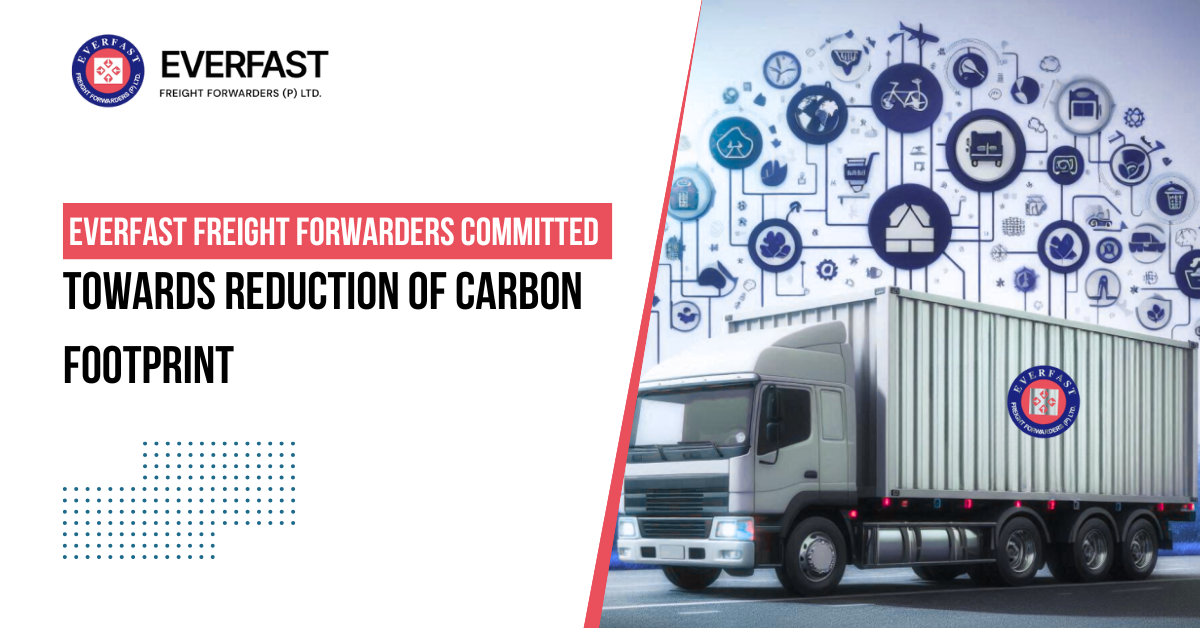
Everfast Freight Forwarders Committed Towards Reduction of Carbon Footprint
As global commerce expands, logistics and shipping play a pivotal role in connecting businesses and consumers. However, this progress comes at an environmental cost, with the logistics industry contributing significantly to global carbon emissions. Sustainable shipping is now a priority as companies seek to balance operational efficiency with environmental responsibility. By adopting greener practices, businesses can reduce their carbon footprint while enhancing brand reputation and operational efficiency.
The Environmental Impact of Shipping
According to the International Maritime Organization (IMO), shipping accounts for nearly 3% of global greenhouse gas emissions. Road freight, widely used in logistics, contributes even more due to its reliance on fossil fuels. With the continued rise of e-commerce and global trade, these emissions are projected to increase unless companies adopt sustainable practices.
The demand for sustainable shipping is driven by both environmental concerns and consumer preferences. More customers are choosing brands that prioritize sustainability, making eco-friendly logistics a competitive advantage.
Key Strategies to Reduce Carbon Footprint in Logistics
Optimize Route Planning
Efficient route planning can significantly reduce fuel consumption and emissions. AI-powered route optimization tools help companies identify the shortest and most fuel-efficient routes, minimizing travel time and emissions.
Transition to Electric and Hybrid Vehicles
Electric and hybrid delivery vehicles provide a greener alternative to diesel trucks. Although the initial investment may be high, the long-term operational savings and environmental benefits make this transition worthwhile.
Use Eco-Friendly Packaging
Sustainable shipping extends to packaging. Businesses can opt for biodegradable, recycled, or reusable materials to minimize waste. Lightweight packaging also reduces fuel consumption during transportation.
Consolidate Shipments
Consolidating smaller shipments into larger ones reduces the number of trips, cutting emissions and costs. Partnering with third-party logistics (3PL) providers that specialize in freight consolidation can make this process more efficient.
Invest in Carbon Offsetting Programs
Carbon offsetting programs allow companies to compensate for emissions by supporting environmental projects such as reforestation and renewable energy. This helps neutralize the environmental impact of shipping operations.
Adopt Green Warehousing Practices
Warehouses consume substantial energy. Investing in energy-efficient lighting, renewable energy sources, and smart temperature control systems can significantly reduce emissions.
Collaborate with Sustainable Partners
Supply chain sustainability requires collaboration. Partnering with eco-conscious suppliers and logistics solutions ensures sustainability is embedded throughout the entire supply chain management
The Business Case for Sustainable Shipping
Sustainable shipping offers several business benefits:
- Cost Savings: Optimized routes and reduced fuel consumption lower operational expenses.
- Brand Loyalty: Eco-friendly practices attract environmentally conscious consumers.
- Regulatory Compliance: Meeting sustainability standards helps companies avoid fines and maintain licenses.
- Innovation Opportunities: Investing in green technologies fosters innovation and positions businesses as industry leaders.
Conclusion
Sustainable shipping is no longer optional — it's essential for businesses aiming to thrive in an eco-conscious world. By adopting strategies like route optimization, electric vehicles, eco-friendly packaging, and carbon offsetting, logistics solutions can significantly reduce their carbon footprint. Embracing sustainability not only helps combat climate change but also enhances brand reputation and drives long-term business growth.
As the logistics industry moves towards a greener future, businesses that prioritize sustainability will lead the way in creating a more responsible global supply chain
